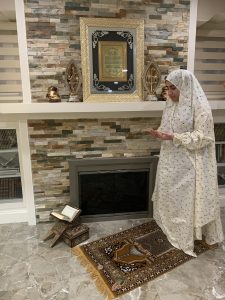Creative Project 4 – The Importance of the Nafs and the Dhikr of Prayer (Week 8)




Throughout our discussions of Islamic spirituality and mysticism, we have focused on one particularly significant metaphorical barrier that threatens to hinder the connection with the Divine: the self ego. Commonly referred to as the nafs in Arabic, the barrier of the self ego is especially important to the spiritual practices within Sufi and Shia Islam. According to these belief systems’ traditions, there are three levels of the self ego: the commanding self (nafs ammara), the blaming self (nafs lawwama), and the soul at peace (nafs mutma’inna) (Marabout in West Africa—Ahmadu Bamba Lecture Powerpoint). In the first and lowest stage, nafs ammara, souls are prompted to commit evil and ultimately stray away from God. In the second stage, nafs lawwama, the soul is inspired by the goodness of the heart and awakens the
conscience, or aql, which subsequently blames the soul for adhering to their ego. As a result, the soul begins to repent. In the third and highest stage, nafs mutma’inna, the soul has achieved its ideal ego of grounded faith and tranquility. In the context of Sufism, nafs mutma’inna frees the soul from worldly concerns and values (such as materialism) guides them to the true path of God, otherwise known as tariqah alhaqiqah (Marabout in West Africa—Ahmadu Bamba Lecture Powerpoint).
Many Islamic practices are available to help Muslims elevate their nafs into nafs lawwama, and eventually nafs mutma’inna. These practices are collectively known as tazkiyah al-nafs (purification of the self ego). Tazkiyah al-nafs includes supplication (dua), and dhikr, the act of remembering Allah in daily life (Sufi Music and Dance Lecture Powerpoint). Depending on a Muslim’s sect and culture, dhikr is practiced in various ways throughout the world, including music, dance, and chanting; nonetheless, all practicing Muslims perform the same 5 instances of dhikr on a daily basis—prayer.
In order to demonstrate one universally practiced form of dhikr (with respect to the Islamic world), I decided to model the motions of an Islamic prayer. I purposely set myself within a spiritual setting (notice the “Allah” plaque, quranic text, and Islamic bookshelf) to emphasize the attempt to seek an intimate connection with God through prayer. Through each motion, Muslims are expected to maintain dhikr by focusing exclusively on their current prayer to God. In one photograph, I model the required prostration in our prayers. Bowing down to Allah generates a sense of humility in Muslims that not only helps reduce their arrogant nafs, but also helps to elevate it towards lawwama and mutma’inna. Hence, prayer is an important Islamic pillar because it helps guide the nafs towards tariqah alhaqiqah.